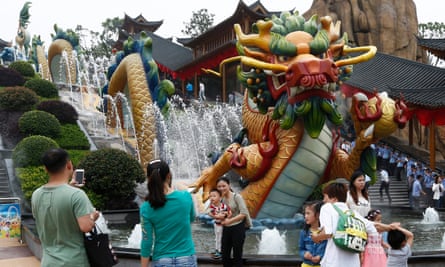China’s largest private property developer, the Wanda Group, has opened an entertainment complex that it is positioning as a distinctly homegrown rival to Disney and its $5.5bn Shanghai theme park opening next month.
Wanda executives unveiled the $3bn Wanda City in the southeastern provincial capital of Nanchang to thundering music reminiscent of the Pirates of the Caribbean theme and hailed the centre as a representative of Chinese entertainment culture in the face of encroaching foreign influences.
Wanda’s massive site includes an $800m China-themed park filled with twirling “porcelain teacup” rides and bamboo forests, an indoor shopping mall with cinemas, restaurants, hotels and the world’s largest ocean park. Disney is set to open its own resort in Shanghai — the largest Disneyland in the world — in June.
As a leading player in Chinese firms’ globalisation push, the property group has invested heavily in the film and cinema business and has spoken openly about its nationalistic mission to fend off Disney in the Chinese market and become an entertainment brand recognised around the world.
In remarks at Saturday’s opening, Wang Jianlin, Wanda chairman and China’s richest man, did not mention Disney by name but said Chinese people “fawned” over Western imports.

“Chinese culture led in the world’s for 2,000 years, but since the last 300 years, because of our lagging development and the invasion of foreign cultures, we have more or less lacked confidence in our own culture,” Wang said. “We want to be a model for Chinese private enterprise, and we want to establish a global brand for Chinese firms.”
Earlier this month he told Chinese state television in an interview that Disney’s foray into China would crumble under more competitive pricing from his group, and warned that the “the frenzy of Mickey Mouse and Donald Duck and the era of blindly following them has passed.”
Wanda’s dealmaking has been similarly aggressive as it quickly diversifies away from China’s weakening real estate market.
The group purchased US-based AMC Theaters cinema chain in 2012 for $2.5bn and paid $3.5bn for Legendary Entertainment — the Hollywood studio behind the Batman franchise — earlier this year as it ramped up its international push.

Seeking to capitalise on China’s rising middle class, developers are planning dozens of Chinese theme park, along with projects from US firms like Universal Studios, DreamWorks and Six Flags. But instead of seeking to capture China’s top tier cities like Beijing or Shanghai, Wanda has built parks in smaller but still massive cities like Wuhan, where it regularly presents the “The Han Show” — a Cirque du Soleil-style acrobatic performance that’s based on the traditional culture of the Han, China’s largest ethnic group.
Even so, there were signs of Disney’s presence in Wanda City. Tourists who opted against paying 198 yuan (about $30) for the theme park and headed for the shopping mall were greeted by what looked like a woman in a Snow White costume as well as storm troopers, the armored soldiers from the Star Wars franchise owned by Disney.
A Uniqlo store was fully stocked with Disney merchandise and sold stacks of Mickey Mouse T-shirts for about $12 each.
In response to a question about the presence of Disney characters, Wanda said in a statement that the company “does not control the promotional activities of retailers.”
